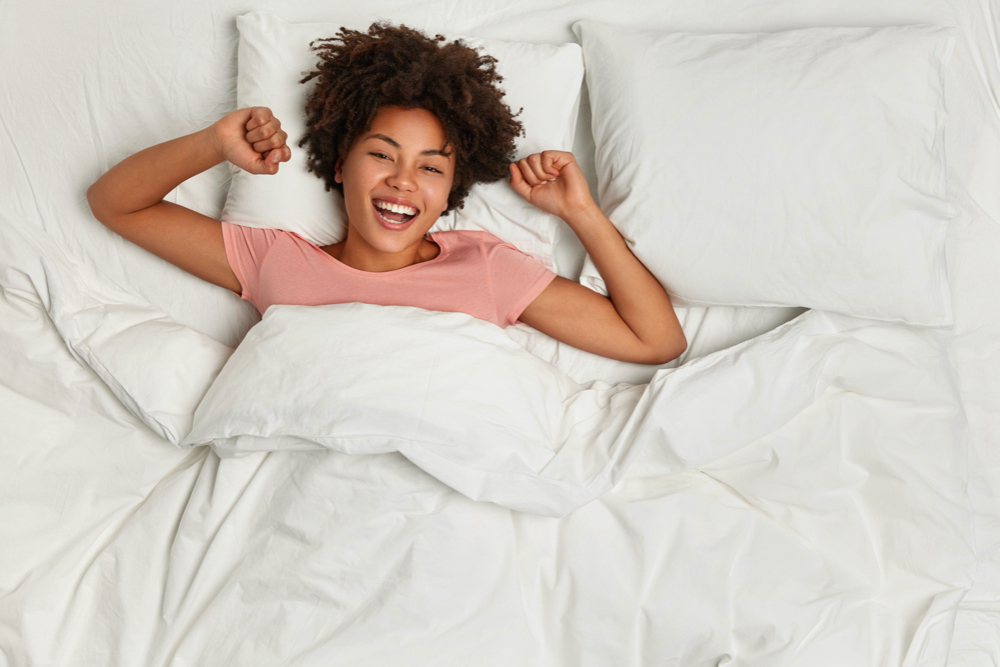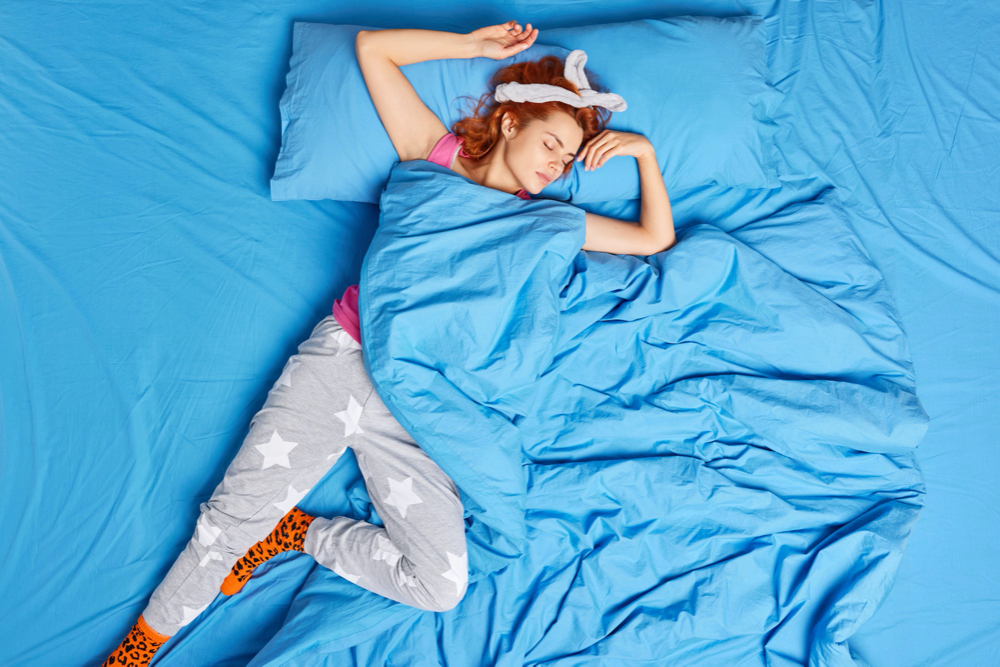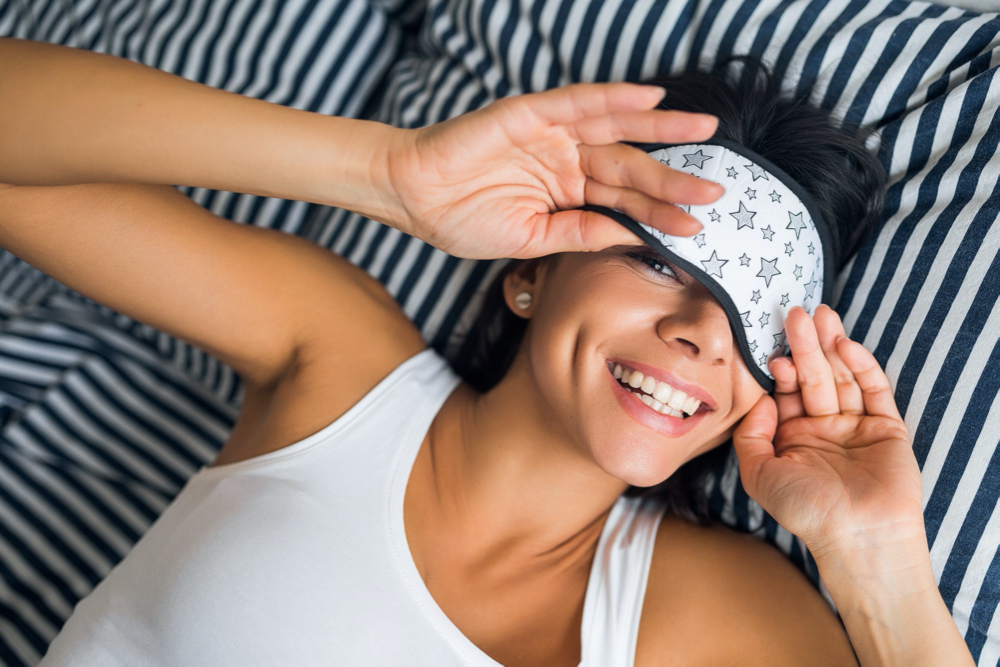- Fast results
- 4,000+ locations
- 4.8 star rating
Need Help? (888) GET LABS

During sleep, your body cools down to perform tissue repair and restoration. Hence, it’s imperative to achieve quality sleep consistently. However, for many people, it doesn’t exactly come in easily. Many factors impact your ability to sleep fast and within the ideal duration. Below, we cover the best tips for sleeping better at night. Keep reading to learn which tip resonates with you the most.

A cooler bedroom can stimulate melatonin production–the hormone responsible for your sleep-wake cycle(1). Increased melatonin makes you drowsy. Hence, it is usually released by the brain’s pineal gland at night.
Regarding room temperature, the perfect range is between 60 and 67 degrees Fahrenheit. Set your thermostat accordingly for undisrupted sleep.
Make sure to sleep at the same time every night. Having a consistent sleeping schedule programs your brain to have a set time when releasing melatonin. This will make it easier for you to get comfortable and ready for bedtime.
Blue light is typically emitted by portable electronic devices like your smartphone, tablet, and laptop. According to research, blue light(2) can suppress melatonin secretion. It confuses your brain, considering light generally indicates daytime, wherein sleep isn’t part of the routine.
Keep your phone away from your bed to avoid the temptation of checking the device now and then. Turn off notifications during bedtime and get an alarm clock so you don’t have to rely on your phone’s app.
A quiet room normally invites relaxation. In most cases, you don’t need to completely eliminate all noise in your room. Just screen the disrupted ones. Consider lacing your windows with heavy drapes or thick curtains to do this. That way, you can minimize the noise outside.
You can also wear earplugs, especially if you’re hypersensitive to sounds. A white-noise machine can also help to help the brain focus.
Invest in a high-quality, comfortable mattress that can help support your back and neck. Make sure your bedding has breathable materials to ensure proper airflow and allow you to cool down. Consider your body type and the level of firmness you deem comfortable.
Eating a heavy meal during dinner, especially immediately before bedtime, may lead to indigestion, as it will take longer for food to digest. This can be uncomfortable and make it difficult to sleep. Lying on your back can also put more pressure on your stomach, resulting in heartburn or acid reflux.
Opt for a light meal during dinner, with easily digestible foods. If you still feel hungry before bedtime, eat light snacks like yogurt.
Coffee is a popular stimulant or energy booster for its caffeine, making it the perfect morning drink to start the day. On the flip side, drinking coffee at night can only delay drowsiness. Coffee restricts adenosine receptors(3) from triggering sleepiness.
The effect of coffee can last for hours. Therefore, if you do manage to sleep after drinking coffee, it’s likely that the quality of your deep sleep will be diminished. Deep sleep is the restorative stage. Hence, you’ll wake up grumpy or groggy.
Stress can trigger your body’s fight or flight response, keeping your brain and vital organs active. As a result, even if your body starts to cool down, sleep onset can still be delayed.
To avoid getting stressed, don’t make it a habit to check emails or messages before going to bed. Stop watching emotionally stimulating shows and fill your mind with positive thoughts.
Also Read: 7 Science-Backed Tips To Sleep Better if You Have Anxiety
Conditioning your body for sleep means bringing your brain to a relaxed state. You can practice relaxation techniques like mindful meditation and deep breathing. A little yoga before going to bed can also help relax your muscles and lessen your brain’s activity.
Also Read: Meditation Benefits: How Mindful Meditation Boosts Your Health
A warm bath can help mimic your body’s cooling down process, which signals the sleeping mode. When you take a warm bath, your body’s temperature will initially rise. But as soon as you leave the tub, it will start to cool down.
Warm baths also promote relaxation and stress relief as they ease muscle tension and release feel-good hormones like endorphins.
Another way to make your environment conducive for sleeping is aromatherapy. Use essential oils and a diffuser to stimulate relaxation through the olfactory route. For example, lavender oil is touted as beneficial for achieving quality sleep. In a randomized trial, with 20 respondents in the control group, 14 exhibited positive intervention effects(4) as far as sleep quality goes.
Thinking about something relaxing can help stimulate relaxation. Visualization is also a form of mindful meditation, which declutters your brain and allows more focus.
Also, by thinking of something calming, like a trip to the beach or your happy memories with friends, you push away any negative thought that keeps you awake.
Books can be stimulating for some. But those with longwinded descriptions and complex content flow can be less exciting, which helps unwind your brain. Keeping it part of your nightly routine can help program your brain for sleep.
Calming music can aid in lowering your heart rate and bringing you to a more relaxed state. It’s because the tempo of this type of music is slower, and the rhythm is usually predictable.
Studies also show that calming music(5), which is slow, discreet, and has minimal modulation, makes you fall asleep faster and get into deep sleep. You are also less likely to feel disturbed all night long.
It’s true when they say worries can keep you awake at night. To stop yourself from worrying, do the opposite–practice gratitude. Instead of thinking about your problems or other things that trigger anxiety, write down everything you are thankful for that day or week. This can stimulate positive scenarios in your head and provide a calming effect.
The benefits of regular exercise extend to sleep quality in that physical activities release happy hormones, especially endorphins, that regulate your mood. You’ll find it easier to relax and fall asleep faster at night.
In addition, exercise improves your cardiovascular health. This, in turn, optimizes your ability to achieve deep sleep.
Keep in mind, however, that it’s not recommended to do strenuous workouts before bedtime. While exercise can help you feel tired and sleepy, too much at night can do the opposite.
Regular exposure to sunlight during the daytime boosts your circadian rhythm. Sunlight is a natural trigger for the regulation of melatonin. In the morning, the production of this hormone is suppressed, while it is increased in the evening to activate sleepiness.
In a study published in the Journal of Affective Disorders, natural light can improve mood and sleep quality(6). In turn, it helps reduce the likelihood of depressive disorder and insomnia.
Daytime naps, especially during afternoons, can help your brain function more for the rest of the day. However, napping beyond 30 minutes can lower your sleep drive in the evening. Hence, it could be more difficult for you to sleep on time at night.
Although the tips above can help you sleep better, that may not be true if you have a sleeping disorder or related health problem. For example, thyroid problems can impact sleep. Hypothyroidism, for instance, can cause discomfort at night as the insufficient hormone production leaves you too cold or causes muscle pain.
If you have been experiencing sleep deprivation often or haven’t been feeling fully rested for days, consult your doctor for an accurate diagnosis of any underlying health condition.
Also Read: How Sleep Deprivation Increases Your Risk for Heart Disease
There is no universal side that is better for sleeping. Some people may find sleeping on their left side more comfortable, while others prefer the right. Ultimately, your body will tell you which side is the best option for your quality sleep.
However, experts outline some benefits of sleeping on each side based on specific cases. For example, if you experience acid reflux at night, the left side might be more comfortable. Gravity will help speed up food movement from your stomach to your small intestine.

Some people can benefit from sleeping without a pillow, while others can sleep better with one. In this sense, none is better than the other, depending on the case. Sleeping without a pillow may improve spinal alignment and lessen neck strain if you are a stomach sleeper. On the other hand, it might not be the better option if you have sleep apnea or back or neck pain, especially if you’re a side or back sleeper.
There’s a chance that alcohol can make you drowsy, which helps you sleep faster. However, expect to have lower sleep quality. Hence, using alcohol to sleep quickly is highly discouraged.
In times when you can’t easily sleep after drinking alcohol, it’s best to hydrate to counteract the effects of the alcohol. Then, make sure to empty your bladder so the sleep gets uninterrupted.

Quality sleep translates to a quality life. If you’re having trouble sleeping well for days, don’t hesitate to consult a doctor. While the aforementioned tips for better sleep can help you, they may not be enough if you have an undiagnosed sleeping disorder.
1 Pevet P, Challet E, Felder-Schmittbuhl MP. Melatonin and the circadian system: Keys for health with a focus on sleep. Handb Clin Neurol. 2021;179:331-343. doi: 10.1016/B978-0-12-819975-6.00021-2. PMID: 34225973.
2 Tähkämö L, Partonen T, Pesonen AK. Systematic review of light exposure impact on human circadian rhythm. Chronobiol Int. 2019 Feb;36(2):151-170. doi: 10.1080/07420528.2018.1527773. Epub 2018 Oct 12. PMID: 30311830.
3 Urry E, Landolt HP. Adenosine, caffeine, and performance: from cognitive neuroscience of sleep to sleep pharmacogenetics. Curr Top Behav Neurosci. 2015;25:331-66. doi: 10.1007/7854_2014_274. PMID: 24549722.
4 Chen TY, Hiyama A, Muramatsu M, Hinotsu A. The Effect of Lavender on Sleep Quality in Individuals Without Insomnia: A Systematic Review. Holist Nurs Pract. 2022 Jul-Aug 01;36(4):223-231. doi: 10.1097/HNP.0000000000000528. PMID: 35708558.
5 Trahan T, Durrant SJ, Müllensiefen D, Williamson VJ. The music that helps people sleep and the reasons they believe it works: A mixed methods analysis of online survey reports. PLoS One. 2018 Nov 14;13(11):e0206531. doi: 10.1371/journal.pone.0206531. PMID: 30427881; PMCID: PMC6235300.
6 Burns, A. C., Saxena, R., Vetter, C., Phillips, A. J., Lane, J. M., & Cain, S. W. (2021). Time spent in outdoor light is associated with mood, sleep, and circadian rhythm-related outcomes: A cross-sectional and longitudinal study in over 400,000 UK Biobank participants. Journal of Affective Disorders, 295, 347-352. https://doi.org/10.1016/j.jad.2021.08.05


We now offer pharmacy discounts through our PersonalabsRx platform.
We now offer pharmacy discounts through our PersonalabsRx platform.